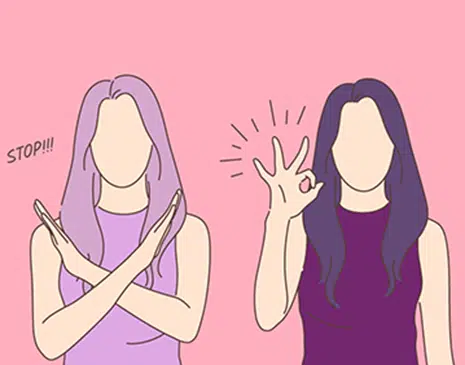The who, what, when and why on sexual consent
This article may be a trigger for anyone who has experienced sexual abuse. Please only continue reading if you feel you are in the right headspace.
Take a step back in time to school sex ed class. You may have memories of your sex ed teacher talking about contraception methods whilst demonstrating the classic move of pulling a condom over a banana (like we hadn’t all tried this prior). Yet, with 2 million Australian adults reporting an experience of sexual assault since the age of 15, could the topic of sexual consent have been completely ignored?
Defined as a mutual agreement before sexual activity that is clear, freely given, enthusiastic and ongoing, only recently are we realising the importance of consent as a fundamental part of sex. Non-consensual sexual behaviour is a criminal act. It’s not open to interpretation. It’s the law. So, let’s take a refresher course, starting with these eight facts the world needs to know about consent right now.
Fact #1 – Clothing is not an indication that someone wants sex
Every person on the planet has a right to express themselves freely in appearance. Clothing doesn’t play a role in getting people assaulted, miseducation does. So, remember, whether a person is dressed conservatively or promiscuously, consent is always required. Clothing is never an invitation for sex. Comprende?
Fact #2 – Being in a relationship doesn’t guarantee sexual consent
Sexual assault within a relationship is still sexual assault. We repeat; sexual assault within a relationship is still sexual assault. It doesn’t matter if a couple has been dating for a few months or married for several years, every act of a sexual nature requires complete respect for physical boundaries and comfort levels.
Fact #3 – Consent for one thing does not automatically mean consent for everything
Everyone has a right to stop or revoke at any time they begin to feel uncomfortable. Just because someone was enthusiastic to try something at one stage of their life, doesn’t mean they’re going to be into it at a later stage of their life. Each time sexual behaviour escalates, a check in for consent should be made. It may seem like a mood-killer at times, but trust us; the alternative has potential to endanger a lot more than a mood.
Fact #4 – Just because a vagina is wet or a penis is hard, does not mean sex needs to occur
When genitals are stimulated, it’s human nature for a body to react, even during a non-sexual scenario or non-consensual scenario. It’s what we call non-concordance, and there’s no human control over this type of reaction. The laws of sexual consent still come into play, so politely abide and keep all parties comfortable.
Fact #5 – Drugs and alcohol affect consent
When either party is under the influence of drugs or alcohol, it’s even more important to communicate boundaries. If someone is taking the lead in sexual acts, they’re responsible for obtaining consent. As a rule of thumb, if a person is stumbling, struggling to stand, slurring their words, or dozing off, consider them incapacitated and unable to consent – an instant no-go for sex.
Fact #6 – Sex workers still need to give consent
Are sex workers human? Damn straight they are. Therefore, sex workers have a right to give consent, both during their work and outside of their work. Occupation doesn’t determine a willingness to engage in a sexual act.
Fact #7 – Anyone can be sexually assaulted, regardless of their gender
With an estimated 1 in 6 women (17%) and 1 in 25 men (4.3%) having experienced at least one sexual assault since the age of 15, it’s clear to see the consensual compass works in every direction. Whether it’s a hetero relationship or same-sex relationship, everyone is granted the same rights when it comes to safe sex.
Fact #8 – Consent can be revoked at any time
Most of you are probably familiar with the ‘No Means No’ campaign. It’s super simple, and super effective. Because, as a human, you have the final say over what happens to your body 100-percent of the time. Consent is not an assumption based on past events or behaviours. If someone feels uncomfortable and wants to stop, their partner should respect these wishes, no questions asked.
Remember, don’t go it alone. Please reach out for help.
Lifeline: 13 11 14 or lifeline.org.au
Beyond Blue: 1300 22 4636 or beyondblue.org.au
Kids Helpline: 1800 55 1800 or kidshelpline.com.au
Headspace: 1800 650 890 or headspace.org.au
Are you anxious? Take the Beyond Blue quiz to see how you’re tracking and whether you could benefit from support







